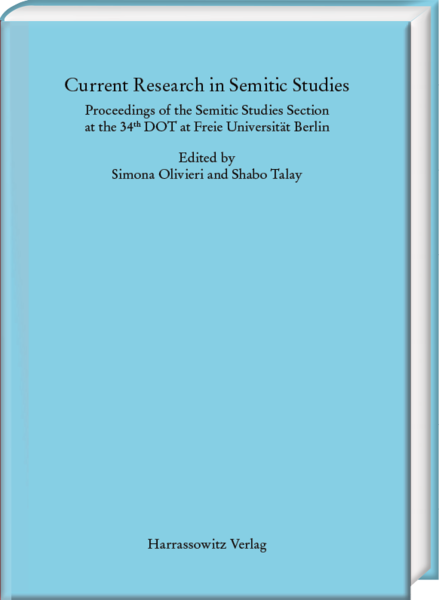In der letzten Zeit sind u.a. diese frei verfügbaren Titel erschienen:
Current research in Semitic Studies: proceedings of the Semitic studies section at the 34th DOT at Freie Universität Berlin
Olivieri, Simona & Talay, Shabo (eds.)
https://www.doi.org/10.13173/9783447121729
This volume contains 22 selected papers in English and German, first presented at the 34th Deutscher Orientalistentag (DOT, www.dot2022.de) of the Deutsche Morgenländische Gesellschaft at Freie Universität Berlin from September 12 to 17, 2022 in the Semitic Studies Section. The DOT has been organized since 1921; the 34th edition in September 2022 celebrated its 100th anniversary. Due to its international scope, the DOT is one of the most important academic conferences worldwide.
In 2022, about 1200 presentations, spread across 23 sections, offered insights into various disciplines and areas of regional and cultural studies. The Semitic Studies Section of the DOT featured over sixty contributions, the abstracts of which can be accessed via the DOT website.
The contributions in this volume provide an overview of current research in the field of Semitic studies and present the diverse approaches and the broad spectrum of topics discussed at the conference.
The 22 papers are divided into three thematic chapters. Chapter A contains contributions on general and comparative Semitics and presents research on several Semitic languages aside from Arabic. Chapter B comprises papers covering Arabic linguistics and dialectology, and chapter C consists of four contributions from a conference panel on the topic of recitation practices of sacred texts.
Reimagining the Globe and Cultural Exchange: The East Asian Legacies of Matteo Ricci’s World Map
Laura Hostetler
https://doi.org/10.1163/9789004684782
How did Asia come to be represented on European World maps? When and how did Asian Countries adopt a continental system for understanding the world? How did countries with disparate mapping traditions come to share a basic understanding and vision of the globe?
This series of essays organized into sections on Jesuit Circuits of Communication and Publication; Jesuit World Maps in Chinese; Reverberations of Matteo Ricci’s Maps in East Asia; and Reflections on the Curation of Cartographic Knowledge, go a long way toward answering these questions about the shaping of our modern understandings of the world.
Ways of Seeking: The Arabic Novel and the Poetics of Investigation
Emily Drumsta
https://doi.org/10.1525/luminos.178
In Ways of Seeking, Emily Drumsta traces the influence of detective fiction on the twentieth-century Arabic novel. Theorizing a “poetics of investigation,” she shows how these novels, far from staging awe-inspiring feats of logical deduction, mock the truth-seeking practices on which modern exercises of colonial and national power are often premised. Their narratives return to the archives of Arabic folklore, Islamic piety, and mysticism to explore less coercive ways of knowing, seeing, and seeking. Drumsta argues that scholars of the Middle East neglect the literary at their peril, overlooking key critiques of colonialism from the intellectuals who shaped and responded through fiction to the transformations of modernity. This book ultimately tells a different story about the novel’s place in the constellation of Arab modernism, modeling an innovative method of open-ended inquiry based on the literary texts themselves.

